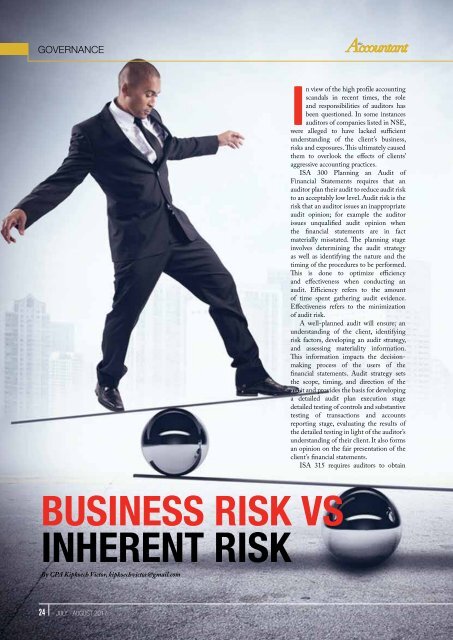The-Accountant-Jul-Aug-2017
Create successful ePaper yourself
Turn your PDF publications into a flip-book with our unique Google optimized e-Paper software.
Governance<br />
In view of the high profile accounting<br />
scandals in recent times, the role<br />
and responsibilities of auditors has<br />
been questioned. In some instances<br />
auditors of companies listed in NSE,<br />
were alleged to have lacked sufficient<br />
understanding of the client’s business,<br />
risks and exposures. This ultimately caused<br />
them to overlook the effects of clients’<br />
aggressive accounting practices.<br />
ISA 300 Planning an Audit of<br />
Financial Statements requires that an<br />
auditor plan their audit to reduce audit risk<br />
to an acceptably low level. Audit risk is the<br />
risk that an auditor issues an inappropriate<br />
audit opinion; for example the auditor<br />
issues unqualified audit opinion when<br />
the financial statements are in fact<br />
materially misstated. <strong>The</strong> planning stage<br />
involves determining the audit strategy<br />
as well as identifying the nature and the<br />
timing of the procedures to be performed.<br />
This is done to optimize efficiency<br />
and effectiveness when conducting an<br />
audit. Efficiency refers to the amount<br />
of time spent gathering audit evidence.<br />
Effectiveness refers to the minimization<br />
of audit risk.<br />
A well-planned audit will ensure; an<br />
understanding of the client, identifying<br />
risk factors, developing an audit strategy,<br />
and assessing materiality information.<br />
This information impacts the decisionmaking<br />
process of the users of the<br />
financial statements. Audit strategy sets<br />
the scope, timing, and direction of the<br />
audit and provides the basis for developing<br />
a detailed audit plan execution stage<br />
detailed testing of controls and substantive<br />
testing of transactions and accounts<br />
reporting stage, evaluating the results of<br />
the detailed testing in light of the auditor’s<br />
understanding of their client. It also forms<br />
an opinion on the fair presentation of the<br />
client’s financial statements.<br />
ISA 315 requires auditors to obtain<br />
Business Risk Vs<br />
Inherent Risk<br />
By CPA Kipkoech Victor, kipkoechvictor@gmail.com<br />
24 JULY - AUGUST <strong>2017</strong>

















